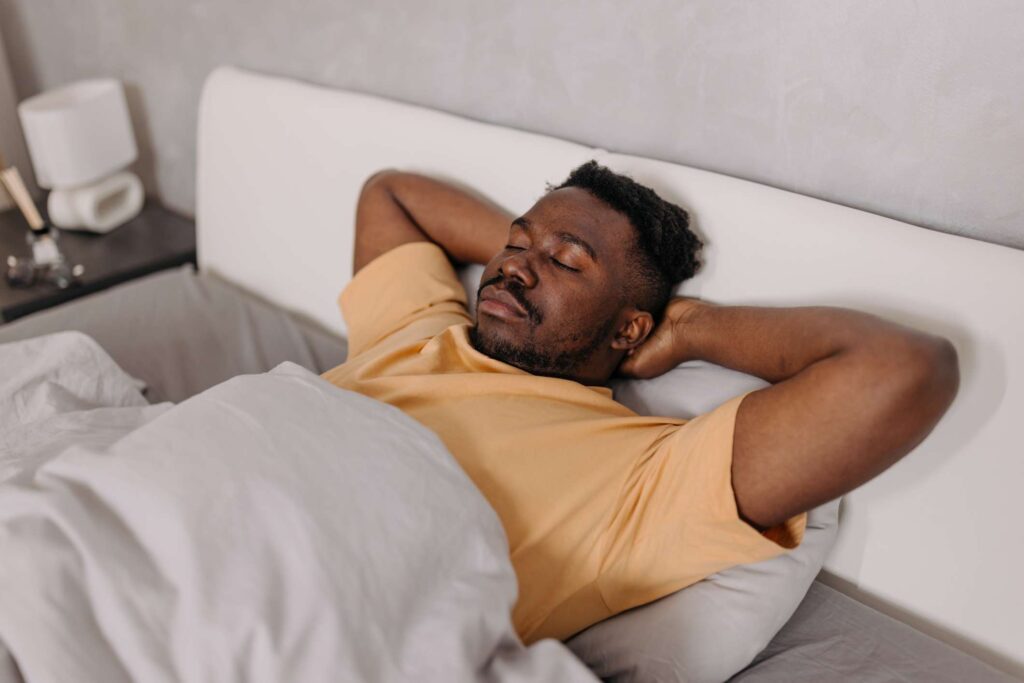High-quality sleep is an essential part of any exercise routine or training program. It helps your muscles recover, reduces soreness, and prepares your body for the next workout. While stretching, hydration, and nutrition support muscle repair and recovery, sleep is one of the most powerful—and often overlooked—tools for building muscle strength and boosting endurance.
Most adults need about seven to nine hours of sleep each night. Athletes and people who exercise often or train at a high intensity may require more sleep than average for optimal recovery and performance.
Sleep needs can vary from person to person, depending on factors like:
- Training intensity and schedule
- Type of activity
- Age
- Stress levels
- Nutrition
- Fitness level
- Overall health
Muscle recovery begins as soon as your workout ends, but sleep plays a vital role in the recovery and repair process. Exercise creates microscopic tears, or microtears, in muscle fibers that require repair for building and strengthening muscle mass.
During sleep, your body shifts into repair mode, healing and rebuilding the muscles engaged during your workout. Here’s how good sleep supports muscle recovery:
- Increases growth hormone production: During deep (slow-wave) sleep, the body releases growth hormone (GH), which supports muscle repair and growth. GH also stimulates the production of other hormones involved in muscle recovery, such as insulin-like growth factor hormone (IGF-1), which helps repair microtears in muscle fibers caused by exercise.
- Supports protein synthesis: Protein synthesis is a metabolic process where the body converts proteins from the foods you eat into muscle tissue. It’s an important step in muscle repair and growth after exercise, and sleep plays a supportive role. A lack of sleep can reduce the body’s ability to synthesize protein after exercise. If you want to boost this process in your body, studies suggest that consuming about 30 grams of protein before bed may increase protein synthesis during sleep by up to 22%.
- Energy restoration: Your muscles store glycogen (sugar) for energy. These stores are depleted during exercise. While you sleep, your body converts carbohydrates and other nutrients into glycogen, restoring muscle glycogen levels and recharging muscles.
- Controls inflammation: Exercise creates temporary inflammation in your muscle tissues. Inflammation is part of the body’s natural healing response, but it contributes to delayed-onset muscle soreness (DOMS) after physical activity. While you sleep, your immune system releases chemicals that help control inflammation and remove waste products that build up in muscles during physical activity. Getting a good night’s sleep boosts your body’s ability to control inflammation, which supports recovery and reduces muscle soreness.
- Reduces muscle tension: Your muscles gradually relax as you move from light to deep sleep. Muscle relaxation during sleep allows muscles to release tension from daily activities and exercise, supporting overall muscle recovery.
- Improves mental focus and coordination: Good sleep helps improve concentration, decision-making, and reaction time—all of which are important for safe and effective workouts. When well-rested, you’re more likely to stay motivated, follow your training plan, and use proper form during exercise.
Too little sleep can slow your body’s recovery process, impair muscle growth and strength, and ultimately impact physical performance. Inadequate sleep can lead to:
- Slower muscle repair and growth
- Decreased muscle strength and endurance
- Higher risk of injuries like strains, sprains, and overuse injuries
- Increased inflammation and muscle soreness
- Slower reaction times
- Poor coordination and balance
- Increased fatigue
- Lower motivation to exercise
Your sleep routine is a powerful tool for optimizing muscle recovery. Making small changes to your routine and adopting healthy sleep habits can help you fall asleep faster, stay asleep longer, and wake up feeling more refreshed.
Here are a few simple ways to improve sleep quality:
- Maintain a consistent sleep schedule by going to bed and waking up at the same time every day.
- Keep your bedroom cool, dark, and quiet to create an environment that supports restful sleep.
- Limit screen time at least an hour before bed; light from phones, TVs, and computers can make it harder to fall asleep.
- Avoid caffeine, alcohol, and heavy meals in the evening, which can interfere with falling or staying asleep.
- Wind down with calming activities such as reading, gentle stretches, or taking a warm bath before bed.
Getting enough quality sleep is one of the most effective ways to support muscle recovery after exercise. Most adults need seven to nine hours of sleep each night, but people who train frequently or at a high intensity may need more.
During sleep, your body undergoes multiple processes that support muscle recovery and repair, including protein synthesis, energy restoration, and inflammation control. Keeping a regular sleep routine, creating a restful sleep environment, and giving yourself time to relax before bed are simple habits that can help you recover faster, perform better, and feel your best.


